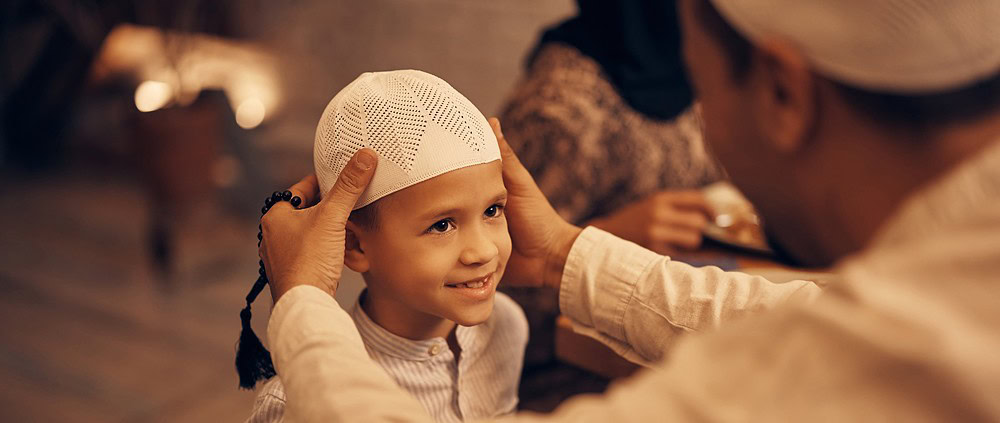What Is the Significance of Child Upbringing in Islam?
Answered by Shaykh Khalid al-Kharsa
Question
What is the significance of child upbringing in Islam?
Answer
In the name of Allah, the Most Gracious and Merciful,
The significance of child upbringing in Islam lies in preparing a generation that carries humanity, morality, and peace and contributes to the development and reformation of the world. Our religion has given considerable attention to child upbringing, advising extra care and attention to them, as they are the new and upcoming generation upon which society relies for its progress and elevation.
Good Upbringing Starts Early
Children are the fruits of marriage, like a tender branch at the start of its growth, which straightens if corrected. Allah (The Most High) says, “And (remember) when Luqman said to his son while advising him, “O my dear son! Never associate (anything) with Allah (in worship), for associating (others with Him) is truly the worst of all wrongs.” And We have commanded people to (honor) their parents. Their mothers bore them through hardship upon hardship, and their weaning takes two years. So be grateful to Me and your parents. To Me is the final return. But if they pressure you to associate with Me what you have no knowledge of, do not obey them. Still keep their company in this world courteously, and follow the way of those who turn to Me (in devotion). Then to Me, you will (all) return, and then I will inform you of what you used to do. (Luqman added,) “O my dear son! (Even) if a deed were the weight of a mustard seed—be it (hidden) in a rock or in the heavens or the earth—Allah will bring it forth. Surely Allah is Most Subtle, All-Aware. “O my dear son! Establish prayer, encourage what is good and forbid what is evil, and endure patiently whatever befalls you. Surely this is a resolve to aspire to.’” [Quran, 31:13-17]
An Impeccable Structure
Not associating partners with Allah, self-regulation, worship, and reform – there is no equal to Islam in its emphasis on educating its children and their thoughts. We need sound structure, abundant knowledge, and correct thinking. The raising of a child, if not sound, will turn him into an enemy to his parents from within, and the most dangerous thing is the internal enemy.
The Dangers of Poor Upbringing
Allah, the Most High, says, “O believers! Indeed, some of your spouses and children are enemies to you, so beware of them.” [Quran, 64:14] It is established that if a person is well-raised and well-mannered, his actions will be upright, and his character will be straight. Conversely, if his upbringing is corrupted, his actions will reflect that, and his character will deteriorate.
For more, see Jamal al-Din al-Qasimi and Jawami’ al-Adab fi Akhlaq al-Anjab.
[Shaykh] Khalid al-Kharsa
Shaykh Dr. Muhammad Khalid al-Kharsa is a distinguished scholar from Syria, born in Damascus in 1960. He holds a bachelor’s degree from the Faculty of Da‘wa Islamiyya in Tripoli, a higher diploma in Comparative Fiqh from the University of Omdurman in 1998, a master’s degree in Comparative Fiqh from the Faculty of Shari‘a and Law at the University of Omdurman in 2002, and a Ph.D. in Comparative Fiqh from the same institution in 2010.
He acquired knowledge and spiritual guidance from Shaykh Muhammad Salih al-Farfur, Shaykh Abdul Razzaq al-Halabi, Shaykh Muhammad Adib al-Kallas, and Shaykh Abdul Rahman al-Shaghouri, may Allah have mercy on them all.
He received Ijazas from several scholars, including Shaykh Muhammad Amin Siraj, Shaykh Abdul Ghani al-Daqar, Shaykh Muhammad Sa‘id al-Kahil, Shaykh Malik bin al-Arabi bin Ahmad al-Sharif al-Sanusi, Shaykh Muhammad Usman Bilal, the Mufti of Aleppo, and others.
Shaykh Khalid lived in Damascus for 52 years, where he engaged extensively in educational and social activities before being displaced from there. He moved to Istanbul at the end of 2015 and co-established “Markaz Jami‘at al-‘Ilm Wa al-Hidaya” within two months of his arrival. In Istanbul, he is active in educational roles. He serves as the director and teacher at the Sheikh Abdul Razzaq al-Halabi Institute, a lecturer at Dar al-Fuqaha, and a teacher at the Dar al-Funun Waqf.
His scholarly works and research include his tahqiq on “al-Rasa li al-Salihat min al-Nisa” by Hafiz Yusuf bin Abdul Hadi, “Adab al-Murta‘i in the Science of Dua (Supplication),” “al-Isti‘ana bi al-Fatiha,” “Rashat al-Aqlam – Explanation of Kifayat al-Ghulam” by Shaykh Abdul Ghani al-Nabulsi in Hanafi Fiqh, “al-Hada’iq al-Wardiyya fi Ajla al-Naqshbandiyya” by Khani, and “al-Arba‘in al-Tusiyya” by Muhammad bin Aslam. May Allah preserve him and make his contributions beneficial.
